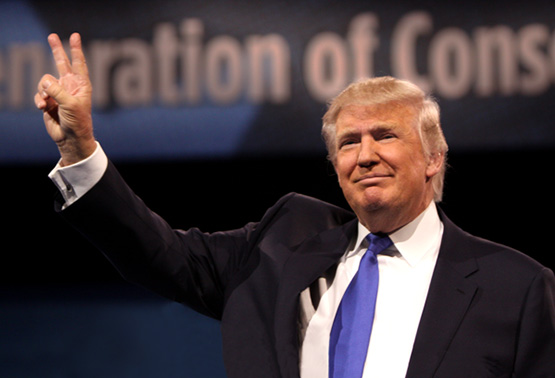The Trump Card
 Till a few weeks ago, nobody would have taken Republican presidential hopeful Donald Trump seriously. His background in business and flare for drama that has led him from industry to industry, including a stint in Hollywood as the creator of the The Apprentice, meant that voters and potential competition alike didn’t view him as a real contender for the oval office.
Till a few weeks ago, nobody would have taken Republican presidential hopeful Donald Trump seriously. His background in business and flare for drama that has led him from industry to industry, including a stint in Hollywood as the creator of the The Apprentice, meant that voters and potential competition alike didn’t view him as a real contender for the oval office.
Yet now, in early 2016, America finds itself facing the possibility of a Trump presidency with his rather unconventional campaign strategy – which critics dismiss as ‘gimmick’ – influencing a section of voters, especially those who are disenchanted with the political establishment itself. In that sense, Trump has managed to gain traction. The trend, though, could change dramatically over the coming weeks.
What would it look like to have a political outsider for president? Would his lack of experience in polity come in the way of governance? For instance, how would Trump navigate the stormy seas of foreign relations?
Trump’s views on foreign affairs can, at best, be described as brusque, with a poignant emphasis on American strength and dominance. He even announced that, if elected, he would erect a wall to keep “undesirable” Mexicans out of American land – with Mexico paying for the wall!
Among young second-generation immigrants, who are often put in the middle of a struggle between their illegal immigrant parents and their desire to maximize on the opportunities in the US, this politically incorrect position won Trump no favors.
Tellingly, in the wake of ISIS and its alleged use of refugee status as a means of entry into Western nations, Trump suggested Muslim immigrants be banned from entering the US in a “total and complete shutdown”. While his distaste for the extremist nature of ISIS is shared by most of the global population, his comments show a lack of understanding of—or a lack of interest in—the struggles of Muslim refugees of warring nations.
With China, according to Trump’s official campaign website, he would like to “strengthen [America’s] negotiating position by lowering our corporate tax rate to keep American companies and jobs at home, attacking our debt and deficit so China cannot use financial blackmail against us, and bolstering the U.S. military presence in the East and South China Seas to discourage Chinese adventurism.” He would also declare China a “currency manipulator” and would put “an end to China’s illegal export subsidies.” He asserts that there will be “no more sweatshops or pollution havens stealing jobs from Americans.”
Trump’s stand is to crush all threats – real and perceived – that America faces. While his stand that the US must strengthen its position against China is on expected lines, some of his other demands are bizarre. For example, Trump says South Korea should pay for the contingent of US troops stationed along the demilitarized zone. He also wants to end America’s defense of Japan.
Trump also has an established, almost fraternal, relationship with Russian President Vladimir Putin, whose actions in the past few years have pitted the latter against many of America’s allies. CNN, which has dubbed this relationship an “international bromance”, observes that part of the basis of their friendship is that the two men are characteristically similar and share similar ambitions for their countries.
Trump has also led his campaign on the promise that he would run America like a business; and business is what he does best. Assuming America could be construed as a business, he might be successful. However, to distill the multi-faceted America of today to a business entity doesn’t do it justice, and it isn’t a realistic interpretation of the attendant nuances of any society and its functions.
An analysis by Politico also suggests that Trump would be a largely an isolationist president with a focus on strength-building at home while reeling in the wide nets the US has cast around the world. This is consistent with his experience as a businessman, but perhaps belies his skills as a leader. Strength is a key tenet of Trump’s narrative, and is likely to carry through to any would-be presidential policies.
As America’s trade relationship with India grows, it is hard to know exactly how a Trump presidency would exert its influence. But, if Trump’s commentary can be taken seriously, his primary motive would be to retract America’s international presence in favor of an isolationist agenda that limits foreign input and influence.
Donald Trump is a candidate of extreme political views and hard-lined policies. Not only do his comments indicate a one-dimensional understanding of international relations, but also they make for a bad starting place in the event he were to become the next US president. Being so hard-lined on the campaign trail would make the task of negotiating / compromise all the more difficult once in office. What he hasn’t yet demonstrated is a foundational knowledge of the fact that compromise is the name of the international game.
=========================================================
 Emily Schauer Brown is an American writer and editor based in Seattle, Washington. Having lived and traveled extensively abroad, she is keenly interested in international affairs.
Emily Schauer Brown is an American writer and editor based in Seattle, Washington. Having lived and traveled extensively abroad, she is keenly interested in international affairs.
Please send your feedback to editor@diplomaticnews.in
